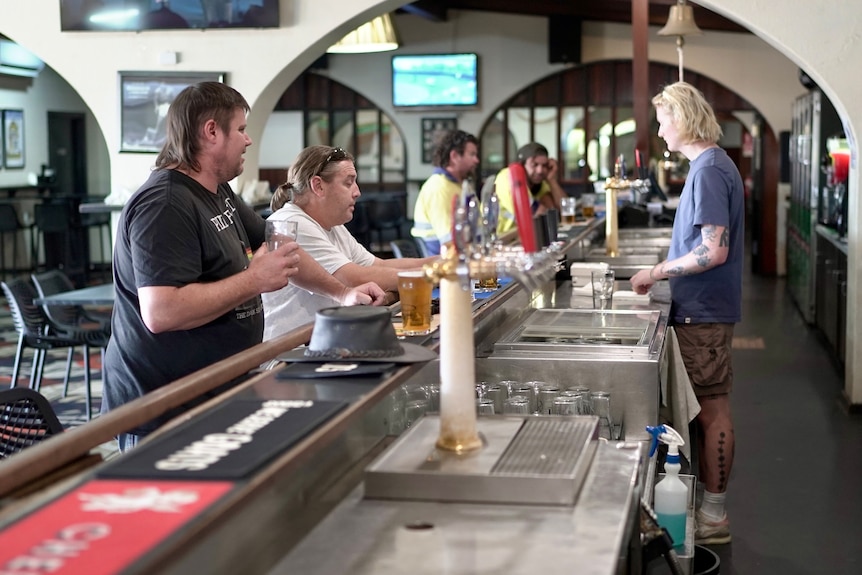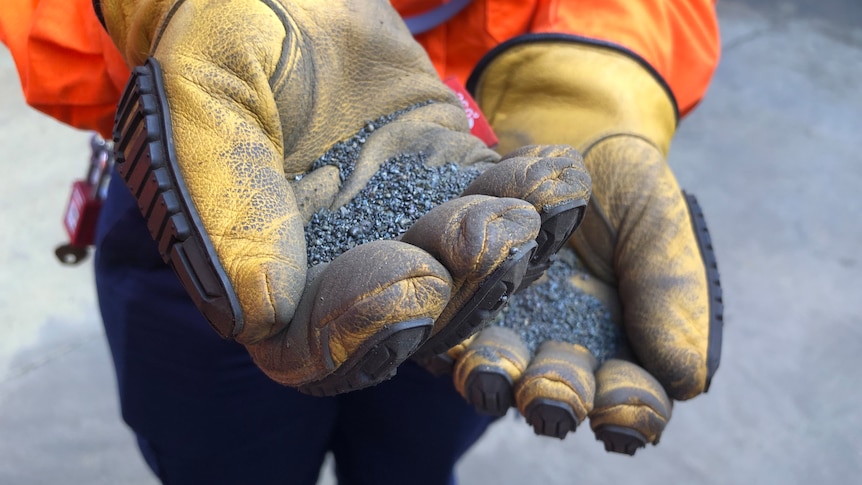The Impact of Nickel Discovery in Western Australia
Unveiling nickel in Western Australia’s arid outback during the late 1960s sparked a whirlwind of events that attracted prominent figures like Harold Holt and Andrew Forrest to the area. The discovery of nickel in Kambalda, located 60 kilometers south of Kalgoorlie, was so exhilarating that even the prime minister graced the occasion. In 1967, Mr. Holt emphasized the significance of this discovery, referring to it as a crucial national asset.
Fast forward to today, nickel is not just important but deemed critical, especially considering its indispensable role in the batteries essential for the global energy shift. The price of nickel soared to unprecedented levels, reaching approximately $76,000 (US$50,000) per tonne two years ago. Recently, billionaire Andrew ‘Twiggy’ Forrest made headlines when he was seen enjoying drinks at Kambalda’s renowned local pub, the Nickel Bar, following his company Wyloo’s acquisition of a major nickel producer in the region.

The Kambalda Hotel and Nickel Bar, a local pub, celebrates the metal that was instrumental in establishing the town. According to Mr. Forrest, Wyloo has prioritized nickel sulphides due to their eco-friendly and cost-effective nature for battery production. The aim is to offer consumers a choice between environmentally friendly “clean nickel” and less sustainable “dirty nickel.” Despite the potential benefits of this volatile commodity, the past year has been marked by significant challenges and fluctuations, resembling a stomach-churning rollercoaster ride. The nickel pickle challenges faced by the Albanese government add another layer of complexity to the industry’s current landscape.
Impact of Nickel Price Challenges on Kambalda Nickel Mine Closure
Amidst the nickel pickle challenges faced by the mining industry, the Kambalda nickel mine in Western Australia is the latest casualty. The closure of this mine marks the third in a series of shutdowns within a few weeks due to the impact of weaker metal prices.
The Albanese government is closely monitoring the situation, as the closure of the Kambalda nickel mine adds to the economic challenges already faced by the region. The fluctuating nickel prices have put significant pressure on the mining sector, leading to difficult decisions such as mine closures.

**The Current State of the Nickel Market**
**Nickel Prices and Industry Impact**
The current price of nickel stands at approximately $24,300 ($US16,000) per tonne, leading to significant repercussions in Western Australia. Several nickel producers in WA have either reduced operations or moved into care and maintenance mode, putting numerous jobs at risk. The situation has created uncertainty and concern among the workforce.
**Local Response to the Downturn**
In response to the downturn, Kambalda publican Steve Cole highlighted the resilience of the local community accustomed to the cyclical nature of the mining industry. He expressed hope that those affected could transition to opportunities in nearby gold mines, emphasizing the availability of experienced mining personnel in the region.
**Challenges and Market Analysis**
Market analyst Tim Treadgold noted the unprecedented speed and severity of the nickel price decline, attributing it to a supply surplus from Indonesia. He predicted a prolonged recovery period, estimating it could take three to four years for the nickel market to stabilize. The unpredictability of the situation has raised concerns among industry experts.
**Emerging Trends in the Nickel Industry**
Warren Pearce, CEO of the Association of Mining and Exploration Companies (AMEC), emphasized the evolving landscape of the critical mineral industry. He highlighted the emergence of a new, valuable sector with significant growth potential. Pearce stressed the importance of seizing opportunities in both upstream and downstream segments to enhance the industry’s position globally.
**Conclusion**
The nickel market faces unprecedented challenges due to a supply glut and evolving market dynamics. Industry stakeholders must adapt to the changing landscape and capitalize on emerging opportunities to ensure long-term growth and sustainability. The Albanese government and other relevant entities need to collaborate effectively to navigate the current nickel pickle challenges successfully.
The Concern Over Nickel Pickle Challenges
Goldfields entrepreneur Ashok Parekh, with four decades of experience in the mining sector, is troubled by the recent price downturn. Familiar with the ups and downs of the industry, he expressed deep concern over BHP’s announcement regarding the future of its Nickel West operations.
The potential uncertainty surrounding Nickel West poses a significant challenge for Parekh, who has witnessed various market fluctuations over the years.

**Government Support Crucial for Nickel Industry in Western Australia**
**Local Businessman Advocates for Government Assistance**
Local businessman Ashok Parekh emphasizes the necessity of increased government support to safeguard Western Australia’s nickel industry. He stresses the importance of government involvement during economic downturns to prevent adverse effects on regions like the Goldfields. Parekh highlights the historical significance of nickel in the Goldfields and the pride associated with the industry.
**Federal Government Response to Nickel Industry Crisis**
Following BHP’s announcement regarding the challenging nickel situation, the federal government took action by including nickel in the critical minerals list. This designation enables nickel producers to access substantial federal funding. While this move was welcomed by the Association of Mining and Exploration Companies (AMEC), it does not guarantee immediate relief for businesses that have already made decisions to halt operations.
**Importance of Nickel in Green Energy Transition**
Nickel plays a vital role in the global shift towards green energy. Recognizing this, the Western Australian government has introduced royalty relief measures and is exploring additional forms of support for the industry. AMEC has been advocating for Production Tax Credits for critical minerals producers, aiming to stimulate downstream processing, particularly in the battery manufacturing sector.
**Proposed Tax Credit Scheme for Critical Minerals**
AMEC proposes a Production Tax Credit system similar to that of the United States to incentivize downstream processing. This scheme would offer a 10% credit on production costs, encouraging value addition within Australia. The focus is on supporting processing activities rather than mining operations, aiming to enhance the value captured by Australian producers.
**Challenges Faced by Nickel Producers**
Several nickel producers in Western Australia have downsized or entered care and maintenance mode in recent months. The federal government is considering various measures to support the industry, with Prime Minister Anthony Albanese expressing a commitment to engaging with stakeholders, including the WA premier, to provide necessary assistance.
**Promoting Australian Nickel as a Premium Product**
Resources Minister Madeleine King is intensifying efforts to market Australian nickel as a sustainable and high-quality product deserving of a premium price. Emphasizing the industry’s adherence to environmental, social, and safety standards, King aims to elevate the perception of Australian nickel in the global market.
**Community Resilience Amid Industry Challenges**
Despite the uncertainties facing the nickel industry, the community in Kambalda remains resilient and optimistic. Long-time residents, like Steve Cole, express confidence in weathering the current challenges, drawing on their experience and camaraderie within the town.
In conclusion, while the nickel industry in Western Australia faces significant challenges, concerted government support and industry initiatives aim to sustain and revitalize this crucial sector. The collaboration between stakeholders, policymakers, and industry players is essential to ensure the long-term viability and success of the nickel industry in the region.



